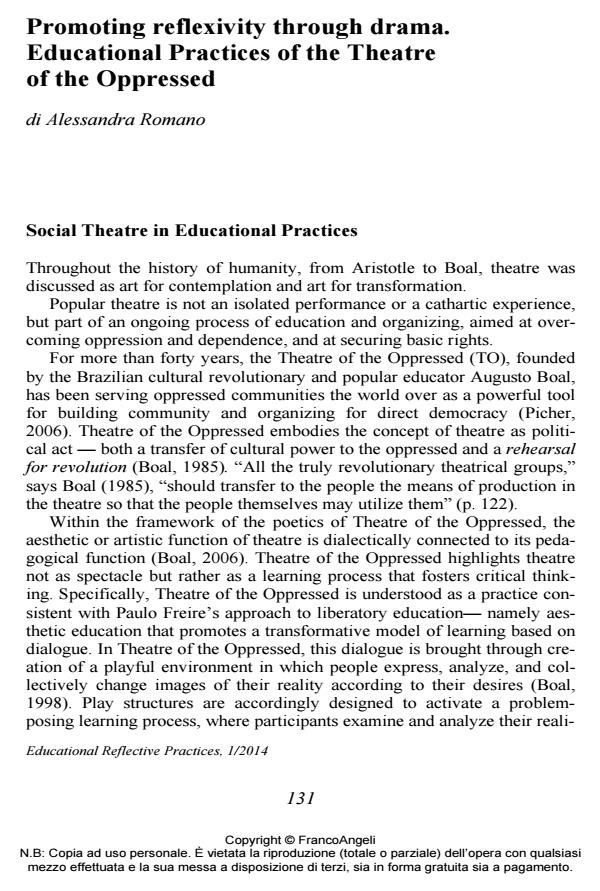Promoting reflexivity through drama. Educational Practices of the Theatre of the Oppressed
Journal title EDUCATIONAL REFLECTIVE PRACTICES
Author/s Alessandra Romano
Publishing Year 2015 Issue 2014/1 Language Italian
Pages 15 P. 131-145 File size 59 KB
DOI 10.3280/ERP2014-001008
DOI is like a bar code for intellectual property: to have more infomation
click here
Below, you can see the article first page
If you want to buy this article in PDF format, you can do it, following the instructions to buy download credits

FrancoAngeli is member of Publishers International Linking Association, Inc (PILA), a not-for-profit association which run the CrossRef service enabling links to and from online scholarly content.
This article is about a still-in-progress research experience that explores the transformative potential of the methods of Boal’s Theatre of the Oppressed. In this exploratory study, more than 60 students were involved in experential workshops with the Theatre of the Oppressed within the setting of university classroom. The aim was to adopt the methodologies and the techniques of Forum Theatre and of Journal Theatre as educational tools to promote reflexivity and transformation in undergraduate students. The results of the analysis of the study confirmed researchers’ hypothesis, showing empirically that the Theatre of the Oppressed could be a useful educational practice not only in informal educational contexts, but specially in formal university contexts.
- Bion, W.R. (1961). Experiences in Groups. London: Tavistock.
- Boal, A. (1985). Theatre of the Oppressed. New York: Theatre Communications Group.
- Boal, A. (1995). The Rainbow of Desire: The Boal Method of Theatre and Therapy. London, UK: Routledge.
- Boal, A. (1998). Legislative Theatre: Using Performance to Make Politics. London, UK: Routledge.
- Boal, A. (2002). Games for Actors and Non-Actors. London, UK: Routledge.
- Boal, A. (2006). The Aesthetics of the Oppressed. London, UK: Routledge.
- Bonnaud-Antignac, A., Grenier, M.H., Mouzarda, A., & Amar, M., (2009). Enseignement de la relation médecin–patient en pédiatrie à des étudiants de médecine à partir de la méthode du Théâtre-Forum. Neuropsychiatrie de l’enfance et de l’adolescence, 57, pp. 510–516.
- Buccolo, M. (2008). La formazione va in scena. Bari: Edizioni Giuseppe Laterza.
- Desai, G. (1990). Theater as Praxis: Discursive Strategies in African Popular Theater. African Studies Review, 33 (1), pp. 65-92.
- Dewey, J. (1938). Experience and Education. In Boydston, J.A. (Eds.). John Dewey. The Later Work. 1925-1953, Vol.13. Carbondale and Edwardsville: Southern Illinois University Press.
- Freire, P. (1970). Pedagogy of the oppressed. New York: Seabury Press.
- Giroux, H. (1987). Literacy and the pedagogy of political empowerment. In Freire, P., & Macedo, D. (Eds.), Literacy: Reading the word and the world. Westport, CT: Bergin & Garvey.
- Girshick Ben-Amos, P. (1999). Art, Innovation, and Politics in Eighteenth-Century. Benin. Bloomington: IndianaU niversity P ress.
- Hardy, T. (1989). Toward a Critical Pedagogy in Sociology through the Use of Drama. Teaching Sociology, 17 (2), pp. 226-231.
- Kidd, R. (1984). Popular Theatre and Nonformal Education in the Third World: Five Strands of Experience. International Review of Education, 30, 3, Adult Educationin a Rapidly Changing World, pp. 265-287.
- Mezirow, J. (1991). Transformative dimensions of adult learning. San Francisco: Jossey-Bass.
- Nordström, A., Fjellman-Wiklund, A., & Grysell, T. (2011). Drama as a pedagogical tool for practicing death notification-experiences from Swedish medical students. BMC Medical Education, 11 (74), pp.1-7.
- Picher, M.C. (2006). Fellowship, 72, (pp. 9 –12). Nyack, N.Y.: Fellowship of Reconciliation.
- Picher, M.C. (2007). Democratic Process and the Theater of the Oppressed. New Directions for Adult and Continuing Education, 116, pp. 79-88, Wiley Interscience.
- Prentki, T. (1998). Must the Show Go on? The Case for Theatre For Development. Development in Practice, 8 (4), pp. 419-429.
- Theory and Practice for Understanding Process and Outcomes of Transformative Learning Claudio Melacarne, Alessandra Romano, in EDUCATIONAL REFLECTIVE PRACTICES 2/2019 pp.214
DOI: 10.3280/ERP2018-002014
Alessandra Romano, Promoting reflexivity through drama. Educational Practices of the Theatre of the Oppressed in "EDUCATIONAL REFLECTIVE PRACTICES" 1/2014, pp 131-145, DOI: 10.3280/ERP2014-001008